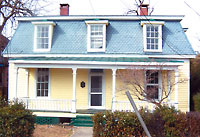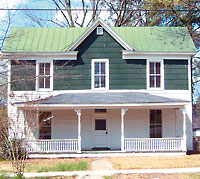Preservation N.C. to clean two historic homes
By Barbara Arntsen
Published in News on April 14, 2004 1:58 PM
A team of debris-fighting citizens concerned with preserving historic houses will be cleaning two properties in downtown Goldsboro this weekend.
A cleanup is scheduled by Preservation North Carolina for Saturday from 10 a.m. until 2 p.m. at these houses:
*King House, 309 N. James St. -- The two-story, white-frame house with a polychrome mansard roof is Goldsboro's surviving example of the Second Empire style, according to "An Architectural Inventory of Goldsboro."

The King House at 309 James St.
*Crowe-Sammeth House, 115 S. Virginia St. -- This two-story, three-bay, framed house has a standing seam tin roof, according to "An Architectural Inventory." The porch across the front has turned wood columns with decorative brackets at the top.
The cleanup will concentrate on the outside property, so volunteers are asked to bring chain saws, rakes, lawnmowers, weed-eaters, clippers work gloves and other yard tools.

The Crowe-Sammeth House at 115 S. Virginia St.
Preservation North Carolina is more concerned with cleaning the yards for both of the properties, because the interiors of both homes have already been cleaned.
Following Saturday's cleanup, the organization will hold an open house celebration at each residence Sunday afternoon. The open houses will begin at 2 p.m.
The King House, valued at $25,000, was donated to Preservation North Carolina by Delmus Bridgers and his family.
The Crowe-Sammeth House, worth $36,900, is owned by the Wayne County Historical Association.
Preservation North Carolina is a nonprofit organization that buys and sells endangered historic buildings, like the Dortch-Bizzell House in Goldsboro. Last year the organization held a similar cleanup day for that house, on the corner of John and Mulberry streets. Both the interior and the exterior were cleaned in a five-hour frenzy.
First Citizens Bank donated the Dortch-Bizzell house to Preservation North Carolina three years ago. After the cleanup, the house was sold to Kerry Thompson of Goldsboro.
The preservation program works through a revolving fund. The premise behind the revolving fund is that Preservation North Carolina acquires endangered historic properties either through option, donation or purchase and finds buyers to rehabilitate them.
As a condition of sale, covenants are placed on the property to ensure its protection. For Preservation North Carolina to get involved with a property, it must be endangered, historically significant, buyable and sellable. A property is considered endangered if it is threatened with immediate demolition, seriously deteriorated or vacant, or likely to be subdivided or otherwise lose its historic integrity.
At a minimum, the property must be eligible for the National Register of Historic Places.
Financial incentives and tax credits are available for buying and renovating historic properties in North Carolina.
